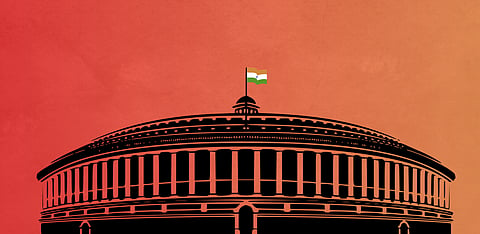

As the Indian Parliament gears up for a "special" session later this month, here is a report card of the Opposition in the monsoon session.
—
THE Indian Parliament is infamous for its protests, sloganeering and disruptions.
The 2023 monsoon session saw Opposition members of parliament (MPs) in both the Lok Sabha and the Rajya Sabha protesting inside and outside the Houses.
In this session, the government passed 12 Bills through both Houses, 10 of them without any debate whatsoever.
It is harmful for a democracy to have laws framed without any parliamentary debate. The opposition pulled out all stops to oppose the Government of National Capital Territory of Delhi (Amendment) Bill, 2023 and the Digital Personal Data Protection Bill, 2023.
But Opposition MPs boycotted all other discussions.
“It is harmful for a democracy to have laws framed without any parliamentary debate.
The questions that then arise are the following:
What qualifies these two and not the other ten Bills passed by the Parliament in this session for parliamentary debate?
Is their implication too trivial to merit the expression of dissent? Is the Opposition not responsible for representing the people's alternative view?
Opposition MPs raised obvious concerns about federalism during the discussion on the Delhi Services Bill and governmental overreach resulting in un-remediable violations of privacy because of the Data Protection Bill.
The fact that the Opposition did not participate in the discussion of other Bills would direct one to assume that there were no objectionable policy decisions made in these. That, however, is not true.
Two examples are illustrative in the context:
First, The Forest Conservation (Amendment) Bill, 2023 was criticised, among other things, for narrowing down the definition of land that can be categorised as "forest" in contravention to the Supreme Court's accepted line of jurisprudence that provides for a broader definition of the term "forest".
However, no one raised these issues to solicit a response from the government as to the underlying rationale for this semantic deforestation. We only have the minister's script.
Second, fishermen's organisations demanded that the government withdraw the Bill regulating the mining of the sea for minerals.
The threat that the operations can lead to "loss of livelihood for thousands of fishermen and damage the environment beyond repair" went unscrutinised as the Parliament passed The Offshore Areas Mineral (Development and Regulation) Amendment Bill, 2023.
Parliamentary debates serve as an extremely effective tool for the Supreme Court to determine the objectives of a legislation.
It also allows the Supreme Court to ascertain the context for defining certain statutory terms. In the November 7, 2022 judgment in Janhit Abhiyan versus Union of India, the Supreme Court observed the following:
"The materials relied on … [by] the parliamentary debates (brief as they are) before it fructified into the amendment, are indicative of what the Parliament wished to achieve through the amendment."
“Parliamentary debates serve as an extremely effective tool for the Supreme Court to determine the objectives of a legislation.
Again, in Vivek Narayan Sharma versus Union of India (demonetisation case) on January 2, 2023, the Supreme Court, while responding to the hypothetical de-legitimisation of other currency bills observed that the following requirement would have to be met for such a step to be valid:
"[S]uch an extensive power cannot be exercised by issuance of a simple gazette notification in exercise of an executive power … same can only be through a plenary legislation, by way of an enactment following a meaningful debate in [the] Parliament, on the proposal of the Central government."
The lack of parliamentary debate seriously restricts the ability of the courts to interpret the statutes more creatively and harmoniously. There simply is not anything for judges to work with.
No questions are asked, no responses given, no explanations extended and no concessions made.
Given their present numbers, the Opposition is not powerful enough to paralyse the House at will. Clearly, the government, therefore, allows for the House to be adjourned when it wants.
This is clear from the fact that while in some instances protests lead to adjournments, in others, the same protest, enacted with the same energy, gets ignored while the chairperson continues to allow debate on Bills.
The Opposition's absence also has the effect that the amendments moved by them were neither raised nor addressed by the government.
This is a scary, if not a devastating trend that seems to be rapidly approaching the stage where it would become a 'custom' in the Indian Parliament.
The MPs, as representatives of the people, are expected to self-regulate their behaviour and performance. The only sanction that they are subject to is ouster from office. While that is fitting, it comes too late, the Bill having already been passed.
We now go back to the questions raised in the last paragraph of the introduction and note some disappointing inferences.
“This is a scary trend that seems to be rapidly approaching the stage where it would become a 'custom' in the Indian parliament.
What qualifies these two and not the other ten Bills passed by the Parliament in this session for parliamentary debate?
Nothing, except for the political optics. Manipur, as a Bharatiya Janata Party-ruled state, is a convenient target for the Opposition to point out the failures of administration by the party. The Opposition MPs have deliberately chosen to neglect certain less-controversial issues, which might fetch fewer brownie points with the populace.
Is the Opposition not responsible for representing the people's alternative view?
It absolutely is. Its failure to do so is, at these crucial moments of democratic challenges, all the more harmful. But there is no reprimanding mechanism.
“Is the Opposition not responsible for representing the people's alternative view?
The only hope is that the self-regulation fervour of Opposition MPs is re-ignited, especially in the run-up to the winter sessions, where some extremely troublesome Bills are pending discussion and passage.